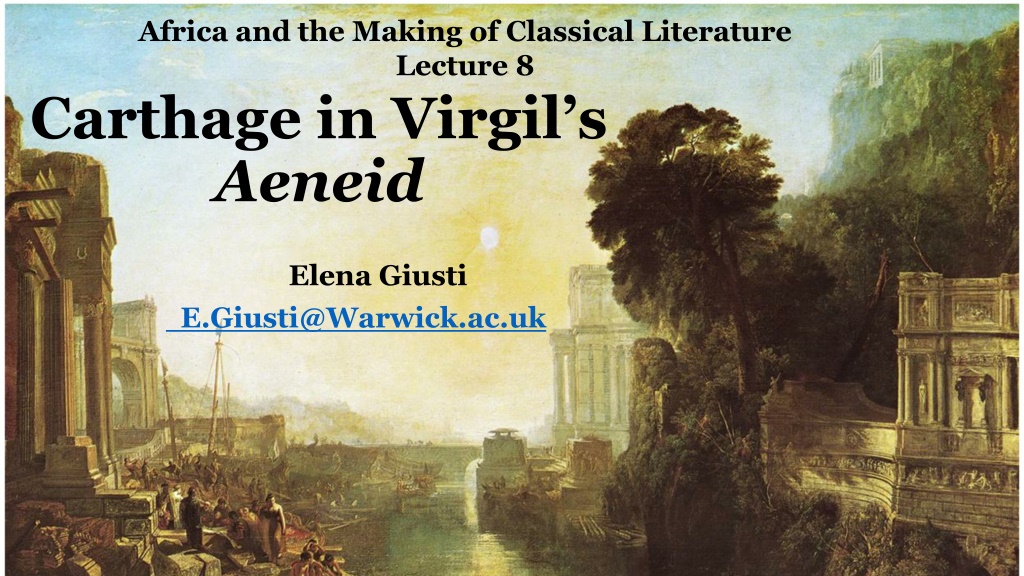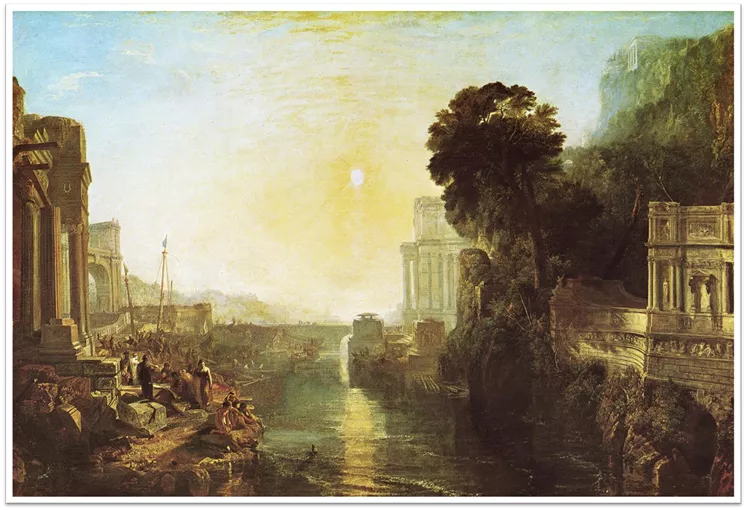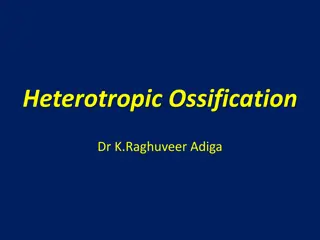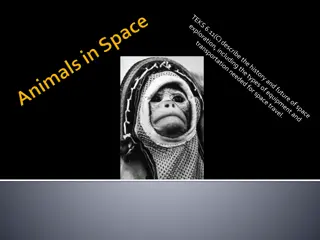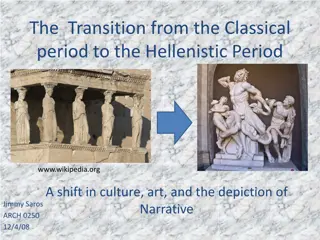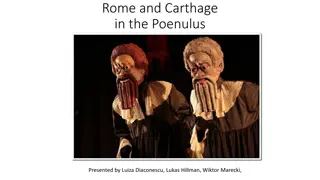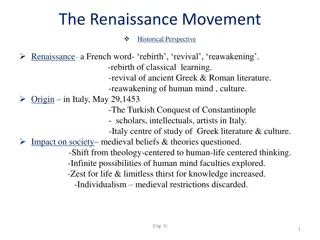Carthage: A Heterotopic Space in Classical Literature
Carthage, as depicted in Virgil's Aeneid and through artworks by Claude le Lorrain and J.M.W. Turner, is examined as a heterotopic space in classical literature. The concept of imagined geographies and heterotopias is explored in relation to Carthage, highlighting how it was represented, contested, and inverted in various texts and artworks, creating an illusionary space that challenges perceptions of reality. Literary excerpts describe the physical features of Carthage, emphasizing its unique qualities. Elena Giusti's analysis further delves into Carthage as a space of empire in Roman literature.
Download Presentation

Please find below an Image/Link to download the presentation.
The content on the website is provided AS IS for your information and personal use only. It may not be sold, licensed, or shared on other websites without obtaining consent from the author. Download presentation by click this link. If you encounter any issues during the download, it is possible that the publisher has removed the file from their server.
E N D
Presentation Transcript
Africa and the Making of Classical Literature Lecture 8 Carthage in Virgil s Aeneid Elena Giusti E.Giusti@Warwick.ac.uk
Claude le Lorrain (1648) The Embarkation of the Queen of Sheba, National Gallery London
J.M.W. Turner (1815) Dido Building Carthage, National Gallery London
J.M.W. Turner (1817) The Decline of the Carthaginian Empire, Tate Britain London
Carthage as an Imagined Geography (Said) or a Heterotopia (Foucault) Imagined Geographies are a tool of power, a means of controlling and subordinating areas; power is in the hands of those who have the right to objectify those that they are imagining (E. Said Orientalism 1978) Heterotopias: physical sites in which diverse, discontinuous, and ambiguous slices of time and space can be accommodated counter- sites in which all the other real sites that can be found within the culture, are simultaneously represented, contested and inverted places that create a space of illusion that exposes every real space as still more illusory (Foucault, M. and Miskowiec, J. 1986. Of Other Spaces, Diacritics 16, 22-7) *Giusti, E. (2017) Virgil s Carthage: a Heterotopic Space of Empire, in M. Asper and V. Rimell (eds.) Imagining Empire: Political Space in Hellenistic and Roman Literature, Heidelberg: Winter Verlag, 133-50.
The Arrival at Carthage 1 (the Harbour) deciphering literary signs Est in secessu longo locus: insula portum efficit obiectu laterum, quibus omnis ab alto frangitur inque sinus scindit sese unda reductos. Hinc atque hinc vastae rupes geminique minantur in caelum scopuli, quorum sub vertice late aequora tuta silent; tum silvis scaena coruscis desuper horrentique atrum nemus imminet umbra. Fronte sub adversa scopulis pendentibus antrum, intus aquae dulces vivoque sedilia saxo, nympharum domus: hic fessas non vincula navis ulla tenent, unco non alligat ancora morsu. There in a deep inlet lies a spot, where an island forms a harbour with the barrier of its sides, on which every wave from the main is broken, then parts into receding ripples. On either side loom heavenward huge cliffs and twin peaks, beneath whose crest far and wide is the stillness of sheltered water; above, too, is a background of shimmering woods with an overhanging grove, black with gloomy shade. Under the brow of the fronting cliff is a cave of hanging rocks; within are fresh waters and seats in the living stone, a haunt of Nymphs. Here no fetters imprison weary ships, no anchor holds them fast with hooked bite Aeneid 1.161-169 Georgics 4.420 (the harbour of Proteus) cogitur inque sinus scindit sese unda reductos Odyssey 9.136-8 (the harbour of the Cyclopes) and in it, too, is a harbor giving safe anchorage, where there is no need of moorings, either to throw out anchor stones or to make fast stern cables Odyssey 13.96ff. (the harbout of Ithaca) at its mouth two projecting headlands, sheer to seaward, but sloping down on the side toward the harbor. These keep back the great waves raised by heavy winds outside, but inside the benched ships lie unmoored when they have reached the point of anchorage. At the head of the harbor is a long-leafed olive tree, and near it is a pleasant, shadowy cave sacred to the nymphs that are called Naiads
The Arrival at Carthage 2 (the site/Colonia Iulia Concordia Carthago) Iamque ascendebant collem, qui plurimus urbi imminet, adversasque adspectat desuper arces. Miratur molem Aeneas, magalia quondam, miratur portas strepitumque et strata viarum. Instant ardentes Tyrii pars ducere muros, molirique arcem et manibus subvolvere saxa, pars optare locum tecto et concludere sulco. [iura magistratusque legunt sanctumque senatum;] hic portus alii effodiunt; hic alta theatris fundamenta locant alii, immanisque columnas rupibus excidunt, scaenis decora alta futuris. Meanwhile they sped on the road where the pathway points. And now they were climbing the hill that looms large over the city and looks down on the confronting towers. Aeneas marvels at the massive buildings, mere huts once; marvels at the gates, the din and paved high- roads. Eagerly the Tyrians press on, some to build walls, to rear the citadel, and roll up stones by hand; some to choose the site for a dwelling and enclose it with a furrow. [and they are choosing laws and magistrates, and an august senate.] Here some are digging harbours, here others lay the deep foundations of their theatre and hew out of the cliffs vast columns, fit adornments for the stage to be. Aeneid 1.419-429 Main literary model: Odysseus among the Phaeacians (Odyssey 7)
Carthage in Book 4 backwards in time? non coeptae adsurgunt turres, non arma iuventus exercet portusve aut propugnacula bello tuta parant: pendent opera interrupta minaeque murorum ingentes aequataque machina caelo. Aeneid 4.86-89 No longer rise the towers begun, no longer do the youth exercise in arms, or toil at havens or bulwarks for safety in war; the works are broken off and idle great menacing walls and cranes that touch the sky. haud aliter terras inter caelumque volabat litus harenosum ad Libyae, ventosque secabat materno veniens ab avo Cyllenia proles. ut primum alatis tetigit magalia plantis Aenean fundantem arces ac tecta novantem conspicit. Aen. 4.256-261 Even thus between earth and sky flew Cyllene s nursling to Libya s sandy shore, and cut the winds, coming from his mother s sire. So soon as with winged feet he reached the huts, he sees Aeneas founding towers and building new houses.
A Fictional Site, for a Fake Story Macrobius Saturnalia 5.17.5 Our author treated that theme so subtly that the story of Dido lost in passion, which everyone knows is not true (quam falsam nouit universitas), has for so many generations now maintained the appearance of truth, and so flits about on the lips of men as though it were true... [Traditional date of the Fall of Troy: 1184 BCE; Traditional date of Dido s Foundation of Carthage: 814 BCE] The Riddle of the Septima Aestas (the Seventh summer), or How Long was Aeneas at Carthage? Aen. 1.755-6 it is now the seventh summer that carries you as a wanderer over every land and sea. Aen. 5.626 The seventh summer is now on the wane since Troy s overthrow but cf. Aen. 4.193 (reports of Fama) Now they spend the winter, all its length, in wanton ease together
Virgils Fama Rumour is quick of foot and swift on the wing, a huge and horrible monster, and under every feather of her body, strange to tell, there lies an eye that never sleeps, a mouth and a tongue that are never silent and an ear always pricked. By night she flies between earth and sky, squawking through the darkness, and never lowers her eyelids in sweet sleep. By day she keeps watch perched on the tops of gables or on high towers and causes fear in great cities, holding fast to her lies and distortions as often as she tells the truth. At that time she was taking delight in plying the tribes with all manner of stories, fact and fiction mixed in equal parts (Aen. 4.173ff.) Paul Weber, Das Ger cht (1943)
Elissa Dux of Carthage Justinus, Epitome of the Philippic History of Pompeius Trogus 18.6 When the power of the Carthaginians, from success in their proceedings, had risen to some height, Hiarbas, king of the Maxitani,desiring an interview with ten of the chief men of Carthage, demanded Elissa in marriage, denouncing war in case of a refusal. The deputies... disclosed the king s message, saying that she herself, if she wished her city to be secure, must do what she required of others. Being caught by this subtlety, she at last said... that she would go whither the fate of her city called her. Taking three months for the accomplishment of her resolution, and having raised a funeral pile at the extremity of the city, she sacrificed many victims, as if she would appease the shade of her husband, and make her offerings to him before her marriage; and then, taking a sword, she ascended the pile, and, looking towards the people, said, that she would go to her husband as they had desired her, and put an end to her life with the sword. As long as Carthage remained unconquered, she was worshipped as a goddess. This city was founded seventy-two years before Rome.
Dido the Chaste Widow Dante, Inferno 5.61-2 L altra colei che s ancise amorosa e ruppe fede al cener di Sicheo The next is she who killed herself for love and broke faith with the ashes of Sichaeus Petrarch, Triumphus Pudicitie 1.155-9 Taccia il vulgo ignorante! Io dico Dido, cui studio d onestate a morte spinse non vano amor, com l publico grido let the ignorant common herd be silent! I speak of Dido, who was driven to death by the pursuit of honesty, not by vain love as the common cry would have it
Dux Femina Facti Ipsa sed in somnis inhumati venit imago coniugis, ora modis attollens pallida miris, crudeles aras traiectaque pectora ferro nudavit, caecumque domus scelus omne retexit. Tum celerare fugam patriaque excedere suadet, auxiliumque viae veteres tellure recludit thesauros, ignotum argenti pondus et auri. His commota fugam Dido sociosque parabat: conveniunt, quibus aut odium crudele tyranni aut metus acer erat; navis, quae forte paratae, corripiunt, onerantque auro: portantur avari Pygmalionis opes pelago; dux femina facti. Devenere locos, ubi nunc ingentia cernis moenia surgentemque novae Karthaginis arcem, mercatique solum, facti de nomine Byrsam, taurino quantum possent circumdare tergo. Aen. 1.353-368 But in her sleep came the very ghost of her unburied husband; raising his pale face in wondrous wise, he laid bare the cruel altars and his breast pierced with steel, unveiling all the secret horror of the house. Then he bids her take speedy flight and leave her country, and to aid her journey brought to light treasures long hidden underground, a mass of gold and silver known to none. Moved by this, Dido made ready her flight and her company. Then all assemble who felt towards the tyrant relentless hatred or keen fear; ships, which by chance were ready, they seize and load with gold; the wealth of grasping Pygmalion is borne overseas, the leader of the enterprise a woman. They came to the place where today you will see the huge walls and rising citadel of new Carthage, and bought ground Byrsa they called it therefrom as much as they could encompass with a bull s hide,
Dux Femina Facti speluncam Dido dux et Troianus eandem deveniunt. prima et Tellus et pronuba Iuno dant signum; fulsere ignes et conscius aether conubiis summoque ulularunt vertice Nymphae. ille dies primus leti primusque malorum causa fuit; neque enim specie famave movetur nec iam furtivum Dido meditatur amorem: coniugium vocat, hoc praetexit nomine culpam. Extemplo Libyae magnas it Fama per urbes Aen. 4.165-173 To the same cave come Dido and the Trojan chief. Primal Earth and nuptial Juno give the sign; fires flashed in Heaven, the witness to their bridal, and on the mountaintop screamed the Nymphs. That day the first of death, the first of calamity was cause. For no more is Dido swayed by fair show or fair fame, no more does she dream of a secret love: she calls it marriage and with that name veils her sin. At once Rumour runs through Libya s great cities
Schiesaro, A. (2008) Furthest Voices in Virgil s Dido, SIFC 100 Reading Dido in the Aeneid and beyond has always been an intensely charged literary and political game current readings emphasize the image of a loving and forlorn heroine whose short outbursts of rage and fury are evanescent and justified. Yet a reading that is willing to delve further into the intertextual complexities of Dido s character, and to probe the relation between intertextual trace and unconscious impulse reveals a darker, more thrilling and suspenseful narrative than modern critics have often allowed themselves to imagine. in Book 4,
La donna mobile: Versions of Dido (2014) Women in the Aeneid are difficult to read. The first woman that Aeneas meet in Book 1 [Venus] is not what she seems Dido is probably the most allusively complex [of the characters in the Aeneid], bearing traces of female characters in previous epic, tragedy and other genres. Dido is Virgil s most intertextual heroine , to use a phrase by Stephen Hinds
G. Verdis Rigoletto (1851) La donna mobile Qual piuma al vento, muta d'accento e di pensiero. Woman is flighty. Like a feather in the wind, she changes in voice and in thought. Always a lovely, pretty face, in tears or in laughter, it's untrue. Sempre un amabile, leggiadro viso, in pianto o in riso, menzognero.
Aeneid 4.566-70 iam mare turbari trabibus saevasque videbis conlucere faces, iam fervere litora flammis, si te his attigerit terris Aurora morantem. heia age, rumpe moras. varium et mutabile semper femina.' sic fatus nocti se immiscuit atrae. You will see her ships churning the sea and deadly torches blazing, and the shore seething with flames, if only dawn will you still lingering in this land. Up then, break off delay! Always a fickle and changeable thing is the woman. So he spoke and melted into the black night.
Dido as Medea, as Procne Aeneid 4.600-602 non potui abreptum divellere corpus et undis spargere? non socios, non ipsum absumere ferro Ascanium patriisque epulandum ponere mensis? Couldn t I have caught his body, torn it apart, scattered it over the waves put his companions to the sword Ascanius too and set him as a dish for his father s table?
Aeneid 4.643-4 Dido as Cleopatra ...maculisque trementes interfusa genas et pallida morte futura ...with her trembling cheeks freckled with red, and pale at the prospect of incoming death Aeneid 8.709 illam inter caedes pallentem morte futura... that famous woman, among all the slaughter, pale at the prospect of incoming death
Dido as Atossa, Carthage as Persia Aeneid 1.12-16 Vrbs antiqua fuit (Tyrii tenuere coloni) / Karthago, Italiam contra Tiberinaque longe / ostia, diues opum studiisque asperrima belli There was an ancient city, the home of Tyrian settlers, Carthage, over against Italy and the Tiber s mouths afar, rich in wealth and stern in war s pursuits. Aeneid 4.466-468in somnis ferus Aeneas, semperque relinqui / sola sibi, semper longam incomitata uidetur / ire uiam et Tyrios deserta quaerere terra... In her sleep fierce Aeneas himself drives her in her frenzy; and ever she seems to be left lonely, ever wending, companionless, an endless way, and seeking her Tyrians in a land forlorn Aeneid 4.665-68 it clamor ad alta / atria: concussam bacchatur Fama per urbem. / lamentis gemituque et femineo ululatu / tecta fremunt, resonat magnis plangoribus aether A scream rises to the lofty roof; Rumour riots through the stricken city. The palace rings with lamentation, with sobbing and women s shrieks, and heaven echoes with loud wails
Dido as Atossa, Carthage as Persia Cf. Susa s Kenandria, Emptiness of Men Aeschylus, Persae 133-9 And beds are filled with tears because the men are missed and longed for: Persian women, grieving amid their luxury, every one, loving and longing for her husband, having sent on his way the bold warrior who was her bedfellow, is left behind, a partner unpartnered.
as Hannibal Aen. 4.624-9 Then you, my Tyrians, pursue his stock with hatred, and the whole line of his descendants to come; send these offerings to my ashes. Let there be no love between our people, no treaties. Rise from my bones, avenger: you shall follow the Dardanian settlers with fire and sword. Now, one day, whenever there is strength. Shores against shores, waters against waters this I pray, weapons against weapons: let them fight, they themselves, and their descendants. Liv. 30.44.7-8 Nor is there a reason why you should think that the Romans are content with your rest. No great state can stay at peace for long. If it lacks an enemy abroad, it finds one at home, just as powerful bodies seem protected from external illnesses, but end up weighed down by the burden of their own strength.
as Hasdrubals Wife Appian Punic Wars 131 It is said that as the fire was lighted the wife of Hasdrubal, in full view of Scipio, arraying herself as best she could amid such disaster, and setting her children by her side, said, so as to be heard by Scipio, For you, Romans, the gods have no cause of indignation, since you exercise the right of war. But upon this Hasdrubal, betrayer of his country and her temples, of me and his children, may the gods of Carthage take vengeance, and you be their instrument. Then turning to Hasdrubal, Wretch, she exclaimed, traitor, most effeminate of men, this fire will entomb me and my children. But as for you, what Roman triumph will you, leader of great Carthage, decorate? Ah, what punishment will you not receive from him at whose feet you are now sitting. Having reproached him thus, she slew her children, flung them into the fire, and plunged in after them. With these words, it is said, did the wife of Hasdrubal die, as Hasdrubal should have died himself.
as Carthage it clamor ad alta atria: concussam bacchatur Fama per urbem. lamentis gemituque et femineo ululatu tecta fremunt, resonat magnis plangoribus aether, non aliter quam si immissis ruat hostibus omnis Karthago aut antiqua Tyros, flammaeque furentes culmina perque hominum volvantur perque deorum. Aen. 4.665-671 A scream rises to the lofty roof; Rumour riots through the stricken city. The palace rings with lamentation, with sobbing and women s shrieks, an heaven echoes with loud wails as though all Carthage or ancient Tyre were falling before the inrushing foe, and fierce flames were rolling on over the roofs of men, over the roofs of gods.
Punic Memories Hints at Carthage s Punic Name Qart hada t = New City Punic word for huts (magalia, or mapalia) memory of the Barcids behind the name of Sychaeus nurse Barce Dido s devotion to Juno = Semitic Tanit, goddess of Carthage Dido s possible connections with the goddess Ashtart (and Anna s with Ashtart s sister Anat), Semitic version of Diana
Postcolonial Dido Tunisian Literature: Fawzi Mellah (1988) Elissa, la reine vagabonde Sophie el Gulli (2004) Hashtart, la naissance de Carthage Other Postcolonial Contexts: Argentinian Juan Cruz Varela s 1823 Dido Senegalese L opold S dar Senghor s 1974 L l gie de Carthage
Christopher Marlowe Dido Queen of Carthage, in Kymberley Sykes 2016 RSC Production There was a production that happened at the National Theatre some time ago but they sort of whited out the race issue. It was motivated mainly towards people who were interested in the classics, which may have been their main focus. I went and saw it and I was probably the only black person in the audience. I was unsatisfied by it because I m from Africa and the play is set in Africa, so I didn t understand why she didn t seem to be African Chipo Chung on an earlier Dido Production Chipo Chung as Dido, 2016
Selected Sources Davidson, J. (1998) Domesticating Dido: History and Historicity. In Burden, M. (1998) (ed.) A Woman Scorn d. Responses to the Dido Myth, London, pp. 65-88. Edgeworth, R. J. (1976-77) The Death of Dido. In CJ 72: 129-33. [e-journal] Giusti, E. (2014) Virgil s Carthaginians at Aen. 1.430-6: Cyclopes in Bees Clothing, CCJ 60, 37-58 Giusti, E. (2017) Virgil s Carthage: a Heterotopic Space of Empire, in M. Asper and V. Rimell (eds.) Imagining Empire: Political Space in Hellenistic and Roman Literature, Heidelberg: Winter Verlag, 133-50. Giusti, E. (2018) Carthage in Virgil s Aeneid: Staging the Enemy under Augustus, Cambridge [e-book] Hardie, P. (2006) Virgil s Ptolemaic Relations, JRS 96, 25-41 Hardie, P. (2014) The Last Trojan Hero, London. Harrison, E.L. (1984). (1972-73) Why did Venus wear boots? Some reflections on Aeneid 1.314f., PVS 12, 10-25: http://digitalvirgil.co.uk/2013/11/06/e-l-harrison-why-did-venus-wear-boots-some-reflections-on-aeneid-1-314f/ --- (1984) The Aeneid and Carthage. In Woodman, T. West, D. (1984) (eds.) Poetry and Politics in the Age of Augustus, Cambridge, pp. 95-115. Hexter, R. (1992) Sidonian Dido. in Hexter, R. Selden, D. (1992) (eds.) Innovations of Antiquity, New York and London, pp. 332-384. Horsfall. N. M. (1973-74) Dido in the Light of History in PVS 13: 1-13: http://digitalvirgil.co.uk/2013/11/06/n- horsfall-dido-in-the-light-of-history/ Schiesaro, A. (2008) Furthest Voices in Virgil s Dido. In SIFC 100: 60-109 and 194-245. [e-journal]
